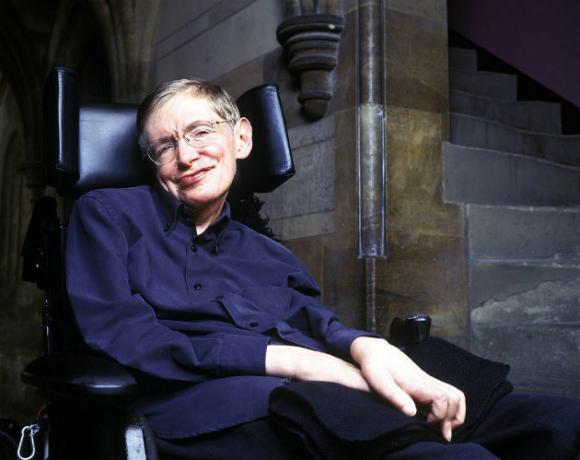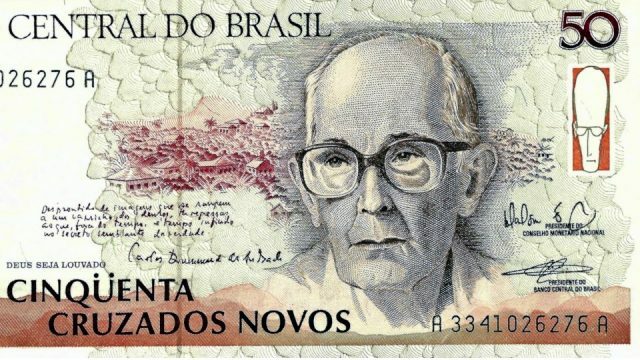Stephen Hawking (1942-2018) was a scientist, professor and author of several books on Cosmology. His studies of black holes earned him notoriety and recognition.
It significantly contributed to the expansion of knowledge of the creation, evolution and current structure of the universe.
In addition to his research, the publication of science books with a language more accessible to the general public, made him the best known astrophysicist today.

Biography
Stephen Hawking was born on January 8, 1942 in Oxford, England, in the midst of World War II.
Son of Frank and Isobel Hawking, he was the eldest of the couple's four children.
Early in his academic life he was considered a good student, but nothing exceptional.
His father, who was a doctor, wanted his eldest son to study medicine. However, Hawking had an aptitude for science from an early age.
At age 17 he was admitted to Oxford University to study Natural Sciences with an emphasis in Physics, graduating in 1962.
In the same year he went on to pursue a doctorate in Cosmology at Cambridge University. There he met Jane Wilde, whom he married 2 years later.
In 1963, he was diagnosed with amyotrophic lateral sclerosis (ALS).
Upon finishing his doctorate, he became a researcher and later became a professor at Cambridge. He started his studies in singularities and black holes. He left the Astronomy Institute in 1973.
In 1979 he joined the Department of Applied Mathematics and Theoretical Physics. He occupied the Lucasiano professorship in Mathematics, also occupied by Isaac Newton. Remaining until 2009.
The article "Black Hole Explosion"(Black hole explosion) is published in 1974. Where he presents the theory that brought him notoriety.
He publishes the Boundaryless Theory in 1982, which describes how the universe could have emerged from nothing.
In 1985 he got pneumonia and almost died. Go through a tracheostomy, which prevents you from speaking naturally.
The book “A Brief History of Time” was published in 1988 and has a sales record. Which makes Hawking one of the best known scientists to the general public.
Stephen Hawking died on March 14, 2018, aged 76 years.
Disease
At the age of 21, Stephen Hawking was diagnosed with a neurodegenerative disease called amyotrophic lateral sclerosis. Doctors predicted he would have a short lifespan.
The disease, which causes muscle weakness and deterioration, has led him to live confined to a wheelchair. He also began to have trouble speaking.
After complications from pneumonia, he needed a tracheostomy and as a result he completely lost the ability to express himself through speech.
He started to communicate through a computer that controls with the facial muscles and a synthesizer that produces an artificial voice.
wife and children
Hawking married twice. His first wife was Jane Wilde, with a degree in Languages. They met at Cambridge while he was still doing his doctorate.
They married in 1965 and separated in 1990. They had three children: Robert, Lucy and Timothy.
Elaine Mason was his nurse and became his second wife in 1995. They broke up in 2006.
The movie "The Theory of Everything" was based on the biography written by his first wife about the couple's married life.
Curiosities
Stephen Hawking was born exactly 300 years after the death of Galileo Galilei (8 January 1642), famous Italian physicist and astronomer.
As a huge supporter of space travel, in 2007 he had the opportunity to experience an environment without gravity by participating in a flight that simulates the feeling of a trip to space.
Main Theories
Along with Roger Penrose, he made studies based on Theory of relativity and it demonstrated that in the past the universe was in a state of infinite density called the singularity. He proposed that space and time would have a beginning in big Bang and an end in a black hole.
He found that in special situations, a black hole emits subatomic particles. These emissions were called Hawking radiation. Furthermore, he demonstrated that black holes also have a temperature, are not completely black, and can still evaporate and disappear.
His boundaryless theory, in partnership with James Hartle, states that the universe it has no limits. In this way, the beginning of the universe happened by the determinations of the laws of science.
Main Books
In addition to his important work as a scientist, Hawking has also written several books. Among them we can highlight:
- A Brief History of Time
- the universe in a nutshell
- A briefer history of time
- the big project
- The universe in a nutshell
- A new history of time
- the theory of everything
- On the Giants' Shoulders
- My short story
He has published, along with his daughter Lucy, children's science fiction books. The secret key to the universe and George and the Big Bang are some examples.
Main awards, titles and medals
- Pius XI Medal of Science, awarded by the Vatican in 1975
- Albert Einstein Medal, awarded by the Albert Einstein Society, Bern, Switzerland in 1978
- Commander of the Order of the British Empire in 1982
- Paul Dirac Medal, awarded by the International Center for Theoretical Physics in London, in 1987
- Joined the Order of Companions of Honor, in 1989
- Presidential Medal of Freedom, USA, in 2009
- Receives a special prize in Fundamental Physics worth $3 million
Despite the numerous awards he received throughout his life and the worldwide recognition of his work, he did not receive the Nobel Prize.
His works are in theoretical physics and in this area it is more difficult to be recognized by the Royal Academy of Sciences of Sweden, which grants the award, due to the difficulty of proving his theories.
Sentences
Watch the video with phrases by Stephen Hawking.


